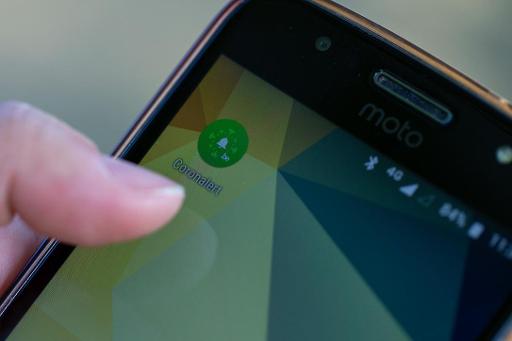The usefulness and benefit of using coronavirus applications, such as Belgium's Coronalert, cannot be proven because of a lack of data collection due to privacy regulations, an investigation has found.
A collaborative project by several international news organisations (VRT NWS, Le Monde Die Zeit, and The Investigative Desk), found that countries continue to invest in these apps without being able to prove that they help contain the pandemic.
Earlier this month, medical professor Jan De Maeseneer (UGent) argued the Coronalert application launched eight months ago has made “no contribution” to the fight against the coronavirus pandemic at a hearing in the Flemish parliament, adding that Belgium should have made it compulsory like in Singapore.
This was disputed by Karine Moykens, head of the Interfederal Testing and Tracing Committee, who said the application can be an important additional technical support for the contact tracing system, as it can also notify the people you have been in contact with but do not remember or those you do not know.
Missing data
In Belgium, the government itself does not know whether the app works effectively, according to the investigation, because they have no data about the real-time use and whether it results in people getting tested when they receive a notification about possible infections.
Moykens' spokesperson confirmed that they only have limited data such as the number of downloads and the number of positively tested people who send their contacts a notification - data which is in part available to the general public.
However, even when knowing the number of downloads and notifications sent, it is still impossible to evaluate the impact of an app like Coronalert, according to Wouter Arrazola de Oñate, epidemiologist and medical director of the Flemish Association for Respiratory Health and Tuberculosis Control.
Arrazola de Oñate added that information such as the number of people who get tested after receiving a notification and the results would better showcase the effectiveness of the app, as you can then "calculate the Secondary Attack Rate (the chance that a person will be infected after contact with an infectious person."
But this data cannot be collected for privacy reasons, as these apps are designed to be completely anonymous.
Epidemiologist at Ghent University, Olivier Degomme argued that the app should be used more to detect sources of infection, but that would require users' location data, and the app is not allowed to collect that, again, because of privacy protection.
Proven (un)effectiveness
At the time of its launch, Moykens emphasised that the application would only be effective if enough people install and use it. The launchers had aimed for an initial download rate of 15% in Belgium, but it has since been downloaded over 2.4 million times, which means it has a download rate of 20%.
However, in February this year, news came out that just 2.5% of those who tested positive for coronavirus, or 15,700 people out of 620,000 positive tests, used the Coronalert application to notify their contacts, despite the government launching several campaigns to draw attention to the importance of the app.
When it comes to the number of infected Europeans who alert contacts via the app, Belgium's figure is among the lowest, as the usage of infected people in a quarter of the 20 countries analysed fluctuate between 12 and 27%.
Meanwhile, in Belgium, the application rollout cost just under €1.3 million euros, which is relatively low compared to other European countries: In Germany, for example, around €65 million was spent on its app.
The government is expected to announce a new campaign to put the Coronalerts app back in the spotlight with a few new tweaks, according to VRT NWS.

